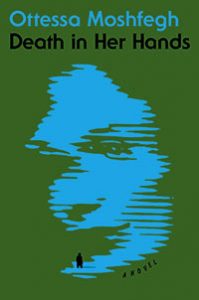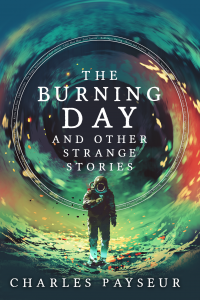Ian Mond Reviews Death in Her Hands by Ottessa Moshfegh
 Death in Her Hands, Ottessa Moshfegh (Penguin Press 978-1-984-87935-6, $18.99, 272pp, hc) April 2019.
Death in Her Hands, Ottessa Moshfegh (Penguin Press 978-1-984-87935-6, $18.99, 272pp, hc) April 2019.
Vesta Gul (pronounced “like the ocean bird”) is walking her dog, Charlie, through the woods when she finds a note on the ground. The note reads:
Her name was Magda. Nobody will ever know who killed her. It wasn’t me. Here is her dead body.
Except there is no body, “no bloodstain. No tangle of hair caught on the coarse fallen branches, no red wool scarf damp with morning dew festooned across the bushes.” Just the note. This is the eerie opening to Ottessa Moshfegh’s third novel Death in Her Hands. Like her two previous books – Eileen and My Year of Rest and Relaxation – both of which I loved, Death in Her Hands is an intense, psychologically driven and female-centric character study (still a rare beast in the publishing world).
Whereas the protagonists of Moshfegh’s previous books were younger women, Vesta is in her seventies, recently moved to the Levant following the death of her husband. She lives alone, with Charlie, her dog, in a cabin that was once the location of a summer camp for Girl Scouts. Given her isolation, Vesta becomes convinced that the note has been written for her: “Who else but me would have found it?… It may just as well have been addressed to me,” and with little to occupy her mind, she begins to fabricate a backstory for both the author of the note, whom she names Blake, and, of course, the victim: “I pictured her teenaged, lithe and slouchy with long black hair… with a name like Magda there must have been something exotic about her.” As Vesta’s obsession with Magda (and Blake) spirals out of control, we get a glimpse into the psychological abuse Vesta endured at the hands of her husband, Walter.
In an industry where women must be portrayed as sympathetic and where only men have the permission to be unlikeable, Moshfegh is one of the few writers (Claire Messud is another) giving voice to feelings of paranoia, self-loathing, and hatred from a female perspective. Vesta is a troubled, lonely, and disagreeable person. She compares the women from the neighbouring township to cows or clapping seals and is less than impressed with their fashion sense: “[The] women mostly dressed in cheap synthetic material… [and] had tattoos on their arms…. [They] looked like they should be on the back of a motorcycle.” In the same breath, Vesta is keen to remind us (or more likely herself) that she’s lived a privileged life: “Didn’t they know I’d worn the most elegant silk blend dresses, gone to dinners at the University? The wife of a state senator had complimented me on my hairdo.” Some of this, the haughtiness, the rudeness, her dismissal of mystery novels (“an artless genre”) and poetry (“what use was there in poems, when people had television now”) is played for laughs. But as Vesta reveals more about her marriage to Walter (the king of negging and gaslighting), we begin to see that her attitude, but also her desire to disconnect from people and reality, is symptomatic of a woman suffering from post-traumatic stress. Where Death in Her Hands really gets under the skin, is when, occasionally, the artifice falls away and Vesta doubts her sanity (“Everything, everybody, even Magda was just a figment of my imagination.”) and where she experiences shocking moments of loathing (“I’d been so pretty once. And now I was ruined, an old lady with a mouth full of dirt.”) and self-awareness (“I thought of my loneliness, my approach in death, how nobody knew me, how nobody cared.”).
As a parody or satire of psychological thrillers and mystery fiction, Death in Her Hands is less effective. Yes, Vesta is the most unreliable of narrators, and I did chuckle when she visits the library to Ask Jeeves (the one search engine she’s familiar with): “How does one solve a mystery?” but if Moshfegh is critiquing the conventions of the genre, then it made little impression on me. If the novel falls flat in that respect, it’s Moshfegh’s take on abuse, on old age, on loneliness, on the realisation of a life wasted that cuts through like a razor. Death in Her Hands continues Moshfegh’s larger literary project to explore the inner life of women in a frank, fearless, and often confronting manner.
This review and more like it in the April 2020 issue of Locus.
 While you are here, please take a moment to support Locus with a one-time or recurring donation. We rely on reader donations to keep the magazine and site going, and would like to keep the site paywall free, but WE NEED YOUR FINANCIAL SUPPORT to continue quality coverage of the science fiction and fantasy field.
While you are here, please take a moment to support Locus with a one-time or recurring donation. We rely on reader donations to keep the magazine and site going, and would like to keep the site paywall free, but WE NEED YOUR FINANCIAL SUPPORT to continue quality coverage of the science fiction and fantasy field.






